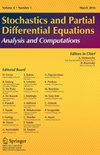Sticky nonlinear SDEs and convergence of McKean–Vlasov equations without confinement
IF 1.4
3区 数学
Q2 MATHEMATICS, APPLIED
Stochastics and Partial Differential Equations-Analysis and Computations
Pub Date : 2023-11-06
DOI:10.1007/s40072-023-00315-8
引用次数: 9
Abstract
Abstract We develop a new approach to study the long time behaviour of solutions to nonlinear stochastic differential equations in the sense of McKean, as well as propagation of chaos for the corresponding mean-field particle system approximations. Our approach is based on a sticky coupling between two solutions to the equation. We show that the distance process between the two copies is dominated by a solution to a one-dimensional nonlinear stochastic differential equation with a sticky boundary at zero. This new class of equations is then analyzed carefully. In particular, we show that the dominating equation has a phase transition. In the regime where the Dirac measure at zero is the only invariant probability measure, we prove exponential convergence to equilibrium both for the one-dimensional equation, and for the original nonlinear SDE. Similarly, propagation of chaos is shown by a componentwise sticky coupling and comparison with a system of one dimensional nonlinear SDEs with sticky boundaries at zero. The approach applies to equations without confinement potential and to interaction terms that are not of gradient type.粘性非线性SDEs与无约束McKean-Vlasov方程的收敛性
提出了一种新的方法来研究McKean意义下非线性随机微分方程解的长时间行为,以及相应的平均场粒子系统近似的混沌传播。我们的方法是基于方程两个解之间的粘性耦合。我们证明了两个副本之间的距离过程是由一个一维非线性随机微分方程的解控制的,该方程在零处有粘边。然后仔细分析这一类新的方程。特别地,我们证明了主导方程具有相变。在Dirac测度为唯一不变概率测度的情况下,我们证明了一维方程和原始非线性SDE的指数收敛平衡。类似地,混沌的传播由一个组件粘滞耦合来表示,并与具有粘滞边界为零的一维非线性SDEs系统进行了比较。该方法适用于没有约束势的方程和非梯度型的相互作用项。
本文章由计算机程序翻译,如有差异,请以英文原文为准。
求助全文
约1分钟内获得全文
求助全文
来源期刊

Stochastics and Partial Differential Equations-Analysis and Computations
Mathematics-Modeling and Simulation
CiteScore
2.70
自引率
13.30%
发文量
54
期刊介绍:
Stochastics and Partial Differential Equations: Analysis and Computations publishes the highest quality articles presenting significantly new and important developments in the SPDE theory and applications. SPDE is an active interdisciplinary area at the crossroads of stochastic anaylsis, partial differential equations and scientific computing. Statistical physics, fluid dynamics, financial modeling, nonlinear filtering, super-processes, continuum physics and, recently, uncertainty quantification are important contributors to and major users of the theory and practice of SPDEs. The journal is promoting synergetic activities between the SPDE theory, applications, and related large scale computations. The journal also welcomes high quality articles in fields strongly connected to SPDE such as stochastic differential equations in infinite-dimensional state spaces or probabilistic approaches to solving deterministic PDEs.
 求助内容:
求助内容: 应助结果提醒方式:
应助结果提醒方式:


